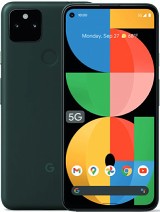Google Pixel 5A: Spot the Difference! By Marques Brownlee
- Okay, so you know those old games that used to be in newspapers that would be like, spot the difference between these two pictures? This really feels like one of those games. (upbeat music) So we have a new Pixel phone, ladies and gentlemen. Not the Pixel 6. So, this was the often rumored, but definitely not canceled Pixel 5a. Yeah, so they announced that it wasn't canceled, but then they never gave us a real date for it. And then they pre-announced the Pixel 6, but now we've quietly got this new Pixel 5a.
It's real. You didn't forget about it, did you? So the Pixel A-Series has been great. We already know what it's about, right? The great cameras, great software, overall value for the money. And they've continued that formula. And there's nothing wrong with that formula, but this is the Pixel 5a, and this is the Pixel 4a 5G, announced in September 2020, nearly a year ago.
And like I said, it's like that game, there are so many unchanged things, this has gotta be the smallest year-over-year refresh I've ever seen between phones in my life. So here, let's just go over all the things that are exactly the same, okay. So it's the same exact specs as last year, Snapdragon 765G chip, same six gigs of RAM, same 128 gigs of storage, same 12-megapixel camera on the back alongside the same 16-megapixel ultra-wide, same back-mounted fingerprint sensor, same speakers and same headphone jack. And it's got the same, perfectly fine 18-watt charging and the same lack of wireless charging. So the natural question is, okay, it's a new phone.
What is actually different? What did they change? So this is where the spotting the differences game comes in. You might've seen the color. Side-by-side, this is the easiest thing to spot. It is a slightly new color. Last year, the 4a 5G was just called, just black.
The new 5a is literally called, mostly black. It's actually a slightly green cast to it, so it kind of catches the light nice sometimes. But yeah, then it looks like a green phone, but it's mostly black. Then the 5a is actually slightly, very slightly larger. It's rocking a 6.3-inch, 1080p, 60 Hertz OLED display instead of the 6.2-inch 1080p, 60 Hertz OLED display from last year. Same pixel density, same hole punch cut out, just a little bit bigger.
And then from there there was a bunch of nice, little, quality of life improvements. You might not ever know just from picking up the phone, but the longer you use it, the more obvious they would be. So the 5a has a metal unibody construction now instead of the straight polycarbonate from last year, and you can hardly tell holding it because they coat it in this soft touch finish anyway. So it feels kind of like a rubberized type of plastic, but no doubt, that's going to wear better over time. And it also lets them get to IP67 water and dust resistance, which the 4a 5G did not have.
And I do like this new textured power button on the 5a. It's got a nice little accent color and I still love when phone makers do this. Honestly, they all should. And it's got a raised pattern to ideate in your pocket, so that's cool. And then on the inside, the Pixel 5a has a substantially larger battery.
So up to nearly 4700 milliamp hours, and that is sweet. So the last A-Series Pixels were already quite good with the battery life because they're not drawing a whole ton of power. Again, they still all have 60 Hertz displays, but the 5a's literal biggest improvement is on something it already did well. So that's totally welcome. Long-lasting battery is always good to see.
But then the only other things you'd be able to identify, you'd have to check the spec list for, Gorilla Glass 6 on the new one versus Gorilla Glass 3 on the 4a 5G. And they actually removed the laser auto focus on the new 5a, so I don't know, maybe a bit of a cost-saving move, kind of a bummer to see that now gone. But at the end of the day, that's everything that's different. Old phone, 499.5a, 449. So honestly, reviewing this phone is like the easy part because it's so similar to last year.
If you're looking for a pretty great all around phone for a mid-range, $500-ish price, other than not having a high refresh rate, I think this is a pretty safe bet. I mean, at this price you're competing against the Samsung A-series, the iPhone SE, Oneplus Nord and a couple of others around there, but this one's going to have the best camera of that bunch, again, and a few nice Google features. Great. My bigger challenge was trying to figure out why. Like, why did Google just make almost the same phone 11 months later? Cause it feels kind of pointless.
But these companies don't do things for no reason. There's gotta be a reason. So number one, I just feel like there is a pressure if you've started to do something year-over-year to just keep it updated even if it's not a big change, It's not a new chip. They didn't add that many features. But if you're just going to offer people the latest available, slightly better version, fine.
But number two, this does have like some weird timing where it comes around the time where we're all now thinking about the upcoming release of the Pixel 6 with Tensor. They literally already pre-announced this new, more exciting Pixel phone that's coming. Of course it will be much more expensive, but that means their only choices really, were to do this or to not release a Pixel 5a at all, or to do 5a with Tensor first. So when you look at it that way, I guess it sort of makes sense that we ended up with this. I mean, you don't want to debut your custom, new silicon design with a mid-range phone because then it inherits the reputation of mid-range silicon, possibly.
You of course want to put it in the shiny, new Pixel 6. So, okay. I get that. Makes sense. And that also likely would have been a bit too expensive for Pixel 5a, so I'm sure they just wanted to release Tensor with a new flagship Pixel.
That's Pixel 6. What's funny is I'm actually pretty confident based on conversations I've had with people at Google that they really actually wanted to launch Tensor with Pixel 5. That's what they wanted to do. They wanted that all to line up, but things didn't quite work out. And so they ended up moving Tensor back and just pushed Pixel 5 out the door with whatever, just a Qualcomm chip that worked with it.
It was a 765G. And so you might have noticed that phone also didn't have the Neural Core and that other custom silicon that's supposed to go with the 765G. It just kind of felt like it got rushed out. So now we're waiting for Pixel 6. So Pixel 6 will launch Tensor.
Pixel 5a is potentially the last Qualcomm-powered, non-Tensor-powered Pixel phone. And so now I think that the biggest question actually is, what is the future of the Pixel A-Series? What will they do with the next versions of this? And if I was betting, I would think that their best plan would be to kind of do the same thing Apple does, which is to use the same chip in the cheaper phone. So what Apple did with the iPhone SE is they use the same chip that was in the iPhone 11, seemingly overpowered, but obviously makes it much more future-proof. Same deal, if they can use the same Tensor chip in Pixel 6a, that would be ideal. Then Google of course, will save money on the rest of the hardware around that chip.
So Pixel 6 is a big phone. It's a metal and glass sandwich type thing, while the A-Series can stay pretty toned down. Honestly, I think this is a pretty solid metal body, Even if it is coated in this rubberized material. It's water resistant, it's a nice size. In a world of sub-$500 phones, this body with a Tensor chip should be pretty good.
Now, in order for all of this to work, we kind of still need Pixel 6 to do somewhat well. There's a lot actually riding on Pixel 6 doing well. We've heard this talk about them ramping up their marketing efforts and really trying on this Pixel to sell a lot of them. But the reason I bring that up, is they want to sell a bunch so that they start making a lot of them in mass and manufacturing at a high scale, so that the price of a chip starts to come down a little bit. And then it will make sense to make a cheaper phone, cheaper body around Tensor and later ship a Pixel 6a.
Because we don't really want a Qualcomm-powered 6a as much as we want a Tensor-powered one, I would think. So yeah, people love the A-Series and Google couldn't resist dropping a minor refresh just to get a new, decent phone at this range out the door. Makes sense. There's a lot of people waiting for it. Now you have it.
There you go. It's pretty good. But yeah, there's just a lot riding on Pixel 6 in Google land, and that's what I'm excited for. Shout out to the sponsor of this video Express VPN. So quick question.
How did you choose which internet provider that you use? Actually, I'll probably just answer that for you. You likely didn't have a choice, or if you did, you're pretty lucky because in most areas you don't have a choice. And so because these ISPs essentially have a monopoly over the areas that they serve, if they start doing things you disagree with, or if they start to track all the websites you visit even when you're in incognito mode, what are you going to do? Switch? You can't. So using Express VPN stops this by rerouting your connection through a secure, encrypted server so your ISPs can't see a thing. And also, rerouting your connection through a different server can actually be kind of fun.
For example, if I want to watch "Modern Family," it's not on US Netflix, no problem. I just connect to a server that's in the UK, refresh and I can watch it. And it's not just "Modern Family. " You can get thousands of other shows on Netflix basically unlocked just by switching your location when you use Express VPN. So if you don't want your ISP to have complete control and knowledge over every website you visit, and you want to unlock more shows, it's kind of a no-brainer.
You can grab Express VPN today. And if you use my code or go to expressvpn. com/mkbhd, that'll get you three extra months free. Thanks again to Express VPN for sponsoring this video.
Source : Marques Brownlee












![Poco M2 Pro vs Redmi Note 8 Pro Speedtest [SD720G vs Helio G90T]](https://img.youtube.com/vi/Nyes-BzZSJ0/maxresdefault.jpg )













